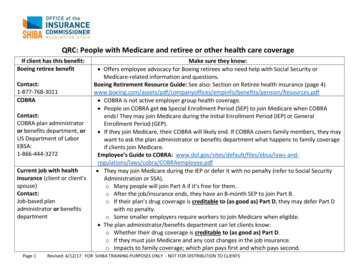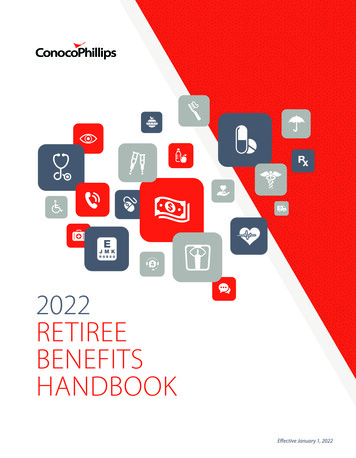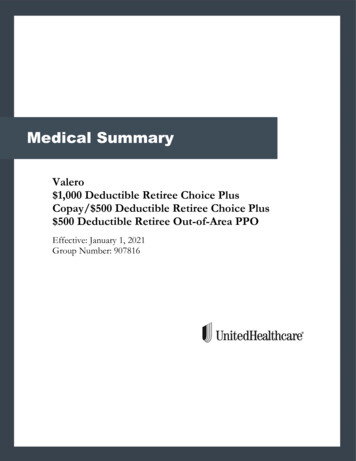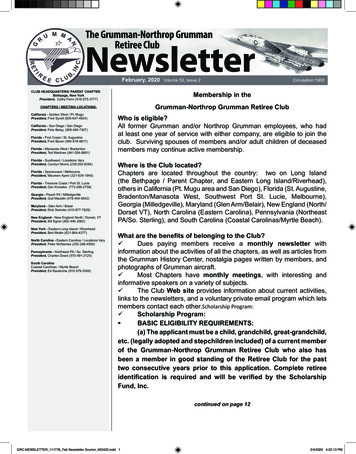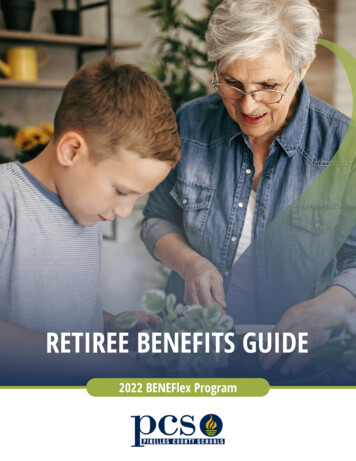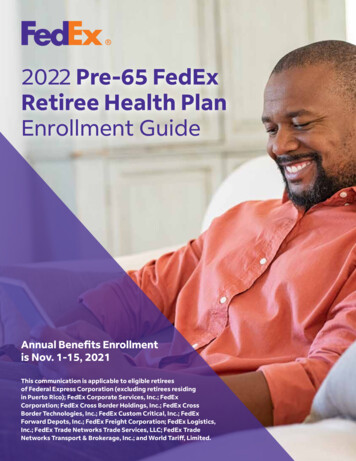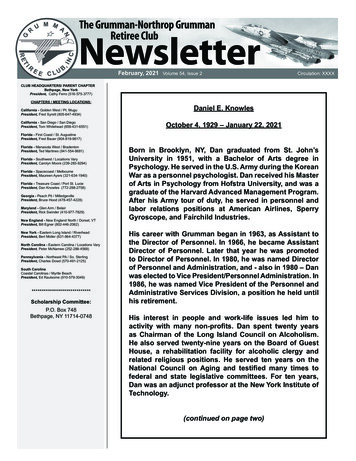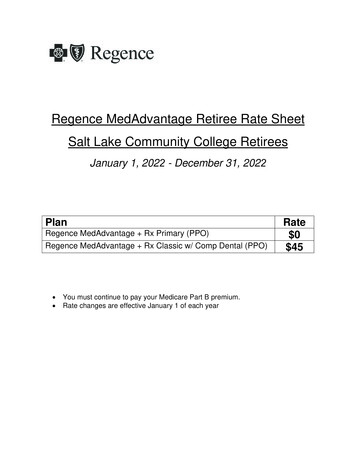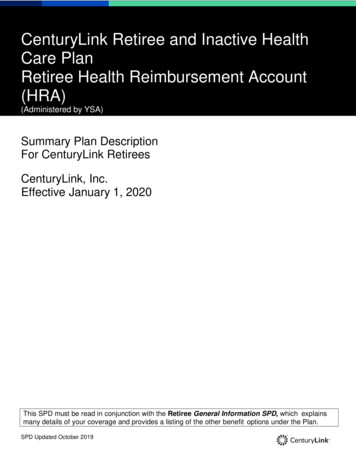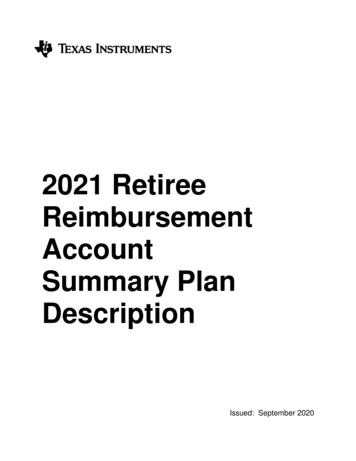
Transcription
2021 RetireeReimbursementAccountSummary PlanDescriptionIssued: September 2020
Table of ContentsImportant Contact Information . 3Introduction . 4Eligibility . 5Retiree Reimbursement Account (RRA) Contributions . 8When Participation Begins and Ends .10Eligible Health Care Expenses .13Continuation of RRA Benefits (COBRA Benefits) .17Claim Filing and Reimbursement .19Appeal Information .21Privacy Rights Notice .26Other Important Information .36ERISA .37Contents2
IMPORTANT CONTACT INFORMATIONCONTACT:FORINFORMATIONABOUT PHONE NUMBER/WEB ADDRESS:Via Benefits*RetireeReimbursementAccount (RRA)844-638-4642TI Benefits Center atFidelity**Address and/orcovered spouse(or domesticpartner) changes888-660-1411MedicareMedicare benefitsand claim status800-633-4227medicare.govSocial SecuritySocial Securitybenefits800-772-1213socialsecurity.govTI Alumni AssociationwebsiteRetiree ts.com/ti* Via Benefits customer service representatives are available Monday throughFriday, from 8:00 a.m. to 9:00 p.m. Eastern time** TI Benefits Center at Fidelity customer service representatives are availableMonday through Friday (excluding all New York Stock Exchange holidays exceptGood Friday), from 8:30 a.m. to 8:30 p.m. Eastern timeImportant Contact Information3
INTRODUCTIONThis is the Summary Plan Description (SPD) for the Retiree ReimbursementAccount (RRA), a health benefit offered by Texas Instruments Incorporated (TI)through the TI Retiree Health Benefit Plan (the “Plan”), as of January 1, 2021 tocertain TI Medicare eligible retirees.The purpose of the RRA under the Plan is to reimburse Medicare eligible retireesfor certain health insurance premiums and health care expenses which are nototherwise reimbursed. Such reimbursements paid by the RRA generally areexcludable from the participant’s taxable income.The RRA is intended to qualify as a self-insured medical reimbursement plan forpurposes of Sections 105 and 106 of the Internal Revenue Code, as amended(Code), as well as a health reimbursement arrangement as defined in IRS Notice2002-45. The RRA and the Plan are also intended to be exempt from theAffordable Care Act as the Plan is a separate “retiree-only” plan pursuant toERISA Section 732(a) and IRC Section 9831(a)(2).The SPD is written in plain language to help you understand how the RRA works.If there is a conflict between the information in this SPD and the plan document,the plan document will govern.Introduction4
ELIGIBILITYRetireeYou are eligible to participate in the Retiree Reimbursement Account (RRA) if youmeet one of the following conditions: You were a participant in the RRA in the last calendar year, you maintainedcontinuous coverage under an individual medical and/or prescription druginsurance policy purchased through Via Benefits; or For anyone who turns age 65, who is enrolled in pre-65 medical coveragethrough TI Extended Health Benefits immediately prior to first becomingeligible to purchase an individual insurance policy through Via Benefits, or For those ages 65 or over, who are currently eligible for enrollment in TIExtended Health Benefits at the time of termination of TI employment.And you meet all of the following conditions: Be eligible for an RRA contribution (see page 8 for more information), and Enrolled in Medicare Part A and Part B, and Maintain a permanent U.S. address, which cannot be in Puerto Rico, Guamor U.S. Virgin Islands, and Enroll within 60 calendar days of first becoming eligible in an individualmedical and/or prescription drug insurance policy through Via Benefits.IMPORTANT NOTE: If you fail to satisfy the requirements to participate in theRRA, you may still purchase one or more individual insurance policies on yourown through Via Benefits.Spouse (or Domestic Partner)Your spouse (or domestic partner) may be your covered dependent under theRRA if they have obtained the age of 65 years or older; and if both of you areenrolled in an individual medical and/or prescription drug insurance policypurchased through Via Benefits. Eligibility requirements for a spouse (or domesticpartner) to be recognized for purposes of the RRA follow: Spouse: Your “spouse” must be recognized under U.S. federal tax law, or Domestic Partner: Your domestic partner of the same or opposite gendermust meet the following criteria:o Unmarried,o Not be related by blood,o Financially interdependent or your domestic partner is primarilydependent on you for care and financial support,Eligibility5
Share a common residence for at least one year and intend to doso indefinitely,o Affirm you are in a committed relationship and intend to remain so,ando Not in a relationship to solely attain benefits.Only health care expenses incurred by the retiree or their covered spouse (ordomestic partner) who are also enrolled in an individual medical and/orprescription drug insurance policy through Via Benefits are eligible to bereimbursed under the RRA.oNo expenses of any other person qualifying as a dependent under U.S. federaltax law (e.g., a child) will be reimbursed under the RRA.IMPORTANT NOTE: If your eligible spouse (or domestic partner) fails to satisfythe requirements to participate in the RRA, they may still purchase one or moreindividual insurance policies on their own through Via Benefits.When You Can Make Spouse (or Domestic Partner) ChangesYou can only make changes within 30 calendar days of a qualified status change,which includes: Changes in legal marital status (marriage, judgment, decree or orderresulting from a divorce, legal separation or annulment) Changes in a domestic partner relationship Changes in employment status for a spouse (or domestic partner) Significant changes in cost of health coverage for a spouse (or domesticpartner) Loss of other health plan coverage, including reaching a plan’s lifetime limiton all benefits for a spouse (or domestic partner) Death of a covered spouse (or domestic partner) Spouse (or domestic partner) goes on or returns from a strike or lockout Exhaustion of all available COBRA coverage for a spouse (or domesticpartner) Changes made by spouse (or domestic partner) during annual enrollmentfor the plan of the spouse (or domestic partner)You must notify the TI Benefits Center at Fidelity within 30 calendar days of anappropriate qualified status change. If such change results in your coveredspouse (or domestic partner) losing coverage under an individual medical andprescription drug insurance policy through Via Benefits, health care expensesincurred after their coverage ceases will not be eligible for reimbursement underEligibility6
the RRA. You will need to remove your ineligible spouse (or domestic partner)from the persons whose health care expenses are eligible to be reimbursed underthe RRA.To be eligible to have their health care expenses reimbursed under the RRA, yournewly eligible spouse (or domestic partner) will need to purchase an individualmedical and/or prescription drug insurance policy through Via Benefits within 60calendar days of the qualified status change event.IMPORTANT NOTE: You have 180 calendar days after your covered spouse(or domestic partner) ceases to be eligible (such as divorce, the end thedomestic partner relationship or death), to request reimbursement of eligiblehealth care expenses incurred before their eligibility ceased.Imputed Income for domestic partnerIf you choose to cover a domestic partner, who is not your dependent for taxpurposes, any amount(s) reimbursed through the RRA for your domestic partnerwill be imputed to you as income and reported to the IRS.Notification of Address ChangeIf you and/or your covered spouse (or domestic partner) should changeaddresses, you should notify the TI Benefits Center at Fidelity as well as ViaBenefits.Eligibility7
RRA CONTRIBUTIONSTI will establish a Retiree Reimbursement Account (RRA) for each eligible retireeand provide for funding of the RRA. Funds in the RRA may be used to reimbursehealth care expenses as defined in Internal Revenue Code Section 213(d)(explained further below) incurred by the retiree or their covered spouse (ordomestic partner). TI will contribute annually each year (typically in January) toyour RRA in the amount TI determines based on your years of TI service, whenyou were hired/rehired by TI and the date you terminated employment with TI.New participants during the calendar year will receive a prorated amount of theannual RRA contribution, based on when you enroll within the 60-calendar-daywindow (see the When Participation/Funding Begins section).Your RRA WILL NOT be credited with funds annually if you do not remaincontinuously enrolled in one of the individual medical and/or prescription druginsurance policies offered through Via Benefits.The IRS regulations do not permit you to make any contribution to your RRA.An RRA is merely a bookkeeping account on TI’s records and does not bearinterest or accrue earnings of any kind.If you terminated employment on or before January 4, 1993 with five ormore years of service and met TI Extended Health Benefits eligibilityrequirements – TI will contribute annually to an RRA on your behalf as well asthat of your covered spouse (or domestic partner). If you have less than fiveyears of service, you and any covered spouse (or domestic partner) will receiveno RRA contribution.If you terminated employment after January 4, 1993, were hired/rehiredbefore January 1, 2001, have 15 or more years of service upon terminationof employment and met TI Extended Health Benefits eligibility requirements– TI will contribute annually to an RRA on your behalf. This TI contributionincreases with each year of service up to 30 years of service. TIers whoterminated employment with 30 years of service or more will receive the largestRRA contribution. Your covered spouse (or domestic partner) will receive noRRA contribution.If you were hired/rehired on or after January 1, 2001 and met TI ExtendedHealth Benefits eligibility requirements – You and any covered spouse (ordomestic partner) will receive no RRA contribution.To maintain your eligibility to receive an annual RRA contribution you mustremain enrolled in an individual medical and/or prescription drug insurancepolicy through Via Benefits.RRA Contributions8
IMPORTANT NOTES: If you and your eligible spouse (or domestic partner) do not purchase anindividual medical and/or prescription drug insurance policy through ViaBenefits within 60 calendar days of initial eligibility (see the WhenParticipation/Funding Begins section), you and your eligible spouse (ordomestic partner) WILL NEVER be eligible to participate in the RRA.However, you and your eligible spouse (or domestic partner) may stillpurchase one or more individual insurance policies on your own through ViaBenefits. If you purchase a medical or prescription drug plan outside of Via Benefits,your medical or prescription plan through Via Benefits will automaticallycancel and will result in losing eligibility for RRA. If you previously had TI group retiree dental coverage only, you are noteligible for an RRA contribution. Additionally if you only purchase anindividual dental insurance policy through Via Benefits, you are not eligible foran RRA contribution.The RRA contribution amount may change at any time. TI reserves the rightto amend, modify or terminate the RRA and the TI Retiree Health Benefit Plan atany time.Account CarryoverContributions remaining in your RRA at the end of a calendar year shall becarried over to the following calendar year to reimburse you or your coveredspouse (or domestic partner) for eligible health care expenses incurred duringsubsequent calendar years.You can request and receive approved reimbursements based on your RRAbalance for the calendar year in which the eligible health care expense wasincurred. Claims incurred in prior year(s) cannot be reimbursed with currentyear’s RRA contribution amount. Additionally, eligible health care expensesincurred in a prior calendar year and submitted for reimbursement in asubsequent calendar year are not eligible for reimbursement if there were NOremaining funds for the prior calendar year in which the expense was incurred.For example, if you incur an expense in the prior calendar year and submit thatexpense in the current calendar year, that expense will only be eligible forreimbursement to the extent funds are remaining from the prior calendar year.RRA Contributions9
WHEN PARTICIPATION BEGINS AND ENDSWhen Participation/Funding BeginsRetireeTo participate in the Retiree Reimbursement Account (RRA), you must purchasean individual medical and/or prescription drug insurance policy through ViaBenefits within the 60-calendar-day window.o If you are working for TI when you retire at age 65 or older, the 60calendar-day window starts on the first calendar day of the month followingthe month in which you terminate employment.o If you are enrolled in TI Extended Health Benefits when you reach age 65,the 60-calendar-day window starts on the first calendar day of the month inwhich you turn age 65 unless your birthday is on the first calendar day ofthe month in which case the 60-calendar-day window starts on the firstcalendar day of the prior month.You are eligible to receive funding of the RRA as follows:o If you are working for TI when you retire at age 65 or older, you are eligiblefor RRA funding as of the first calendar day following your terminationdate. Actual funding of the RRA (a proration of the annual RRAcontribution) will occur as of the date your insurance policy is in effectthrough Via Benefits.o If you are enrolled in TI Extended Health Benefits when you reach age 65,you are eligible for RRA funding as of the first calendar day of the month inwhich you turn age 65 unless your birthday is on the first calendar day ofthe month in which case eligibility begins as of the first calendar day of theprior month. For example, if your 65th birthday is on August 8th, your RRAeligibility starts on August 1st. And, if your 65th birthday is on August 1st,your RRA eligibility starts on July 1st. Actual funding of the RRA (aproration of the annual RRA contribution) will occur as of the date yourinsurance policy is in effect through Via Benefits.Spouse (or Domestic Partner)To participate in the RRA, your eligible spouse (or domestic partner) mustpurchase an individual medical and/or prescription drug insurance policy throughVia Benefits within 60 calendar days of initial eligibility (same eligibility as anenrolled participant described above). Funding of the RRA for your eligiblespouse (or domestic partner) is prorated as detailed above for a Retiree.When Participation Begins and Ends10
When Participation EndsRetireeYour participation in the RRA ends on the earliest of the following dates: Date you are rehired by TI as an active employee; Date of your death; Date your individual medical and prescription drug insurance policypurchased through Via Benefits ends for any reason; or Effective date of any TI Retiree Health Benefit Plan amendmentterminating your eligibility under the RRA or terminating the RRA.IMPORTANT NOTES: If your individual medical and/or prescription druginsurance policy coverage stops for any reason (e.g., you decide to notpay the premium or you purchase a medical and/or prescription drug policyoutside of Via Benefits), you lose all rights to any future RRA contributionsby TI. If you purchase an individual insurance policy through Via Benefitsafter your previous policy ended, you WILL NEVER be eligible for anyfuture RRA contributions. You may still seek reimbursement for eligiblehealth insurance premiums and health care expenses incurred through thedate your policy coverage ended and any RRA contributions before yourpolicy ended will remain in your RRA, no proration.If your individual medical and prescription drug insurance policy at ViaBenefits is dropped for any reason (e.g., you decide to not pay thepremium or you purchase a medical and/or prescription drug policy outsideof Via Benefits), your eligible dependents under the age of 65 willpermanently lose their TI group retiree medical and dental coverage andthey WILL NOT be eligible to enroll again at any time in the future.DeathIf you have a spouse (or domestic partner) who is currently enrolled in medicaland/or prescription drug coverage through Via Benefits at the time of your death,the joint RRA will continue, as long as they remain eligible for the RRA. If yoursurviving spouse (or domestic partner) was receiving an annual RRA contributionbefore your death, they will continue to receive an annual RRA contribution, aslong as they remain eligible for the RRA. Otherwise, your surviving spouse (ordomestic partner) will not receive an annual RRA contribution. If your covereddependent remarries (or domestic partner commences a new relationship),participation in the RRA WILL END.When Participation Begins and Ends11
If you don’t have an eligible spouse (or domestic partner) participating in the RRAat the time of your death, your RRA is immediately forfeited.IMPORTANT NOTE: Your estate or representative may submit claims forreimbursement of eligible health care expenses incurred during yourparticipation in the RRA. Claims must be submitted within 180 calendardays of your death.Spouse (or Domestic Partner)Your covered spouse’s (or domestic partner’s) participation in the RRA ends onthe earliest of the following dates: Date they cease to be a covered dependent for any reason (e.g.,divorce or remarriage following retiree’s death); Date of their death; Date individual medical and prescription drug insurance policy throughVia Benefits for your covered spouse (or domestic partner) or you endsfor any reason other than your death; or Effective date of any TI Retiree Health Benefit Plan amendmentterminating their eligibility under the RRA or terminating the RRA.IMPORTANT NOTE: You have 180 calendar days after your eligibilityfor the RRA ceases during which you must request reimbursement ofeligible health care expenses you incurred before your eligibilityceased.When Participation Begins and Ends12
ELIGIBLE HEALTH CARE EXPENSESAn eligible health care expense is an out-of-pocket expense incurred by you or acovered spouse (or domestic partner) for medical, prescription drug, dentaland/or vision care as permitted under Internal Revenue Code Section 213(d).You may use your Retiree Reimbursement Account (RRA) for reimbursement ofeligible health care expenses, provided the expense: Has been incurred by you or your covered spouse (or domestic partner)while covered under an individual medical and/or prescription druginsurance policy purchased through Via Benefits; Does not exceed your RRA balance; Is not reimbursed or reimbursable under any private, employer-provided,or public health care reimbursement or insurance arrangement; and Is incurred while you are participating in the RRA.Some common examples of eligible health care expenses include: Acupuncture; Ambulance services; Chiropractic services; Contact lenses or glasses used to correct a vision impairment; Dental expenses; Dermatology; Hearing aids; Long-term care qualified services that are prescribed by a licensed healthcare practitioner; Out-of-pocket expenses like deductibles, coinsurance and copays; Physical therapy; Premiums for qualified health plans, as defined under Internal RevenueCode Section 213(d); Prescription drugs*; Vision expenses; andEligible Health Care Expenses13
Wheelchairs.*IMPORTANT NOTE: Prescription drug copay/coinsurance are eligible forreimbursement from the RRA. However, there are special considerations forreimbursement of prescription drug out-of-pocket costs. Medicare requiresyou to pay out-of-pocket a certain amount of prescription drug costs beforeyou are covered by the catastrophic prescription drug coverage. As a result,if you receive reimbursements for prescription drug out-of-pocket costs, itmay take longer to reach the catastrophic prescription drug coverage level.You may want to consult with a financial advisor regarding the use of yourRRA funds for prescription drug out-of-pocket costs because this may delaywhen you become eligible for the catastrophic prescription drug coverage.For more information on catastrophic prescription drug coverage, see thesection titled Catastrophic Pharmacy Special Reimbursement on page 15.Some examples of common items that are not eligible health care expensesinclude: Cosmetic surgery or similar procedures (unless the surgery is necessary tocorrect a deformity arising from a congenital abnormality, accident ordisfiguring disease); Funeral and burial expenses; Health club or fitness program dues; Household help; and Massage therapy.For more information about what items may or may not be eligible health careexpenses, contact Via Benefits or consult IRS Publication 502 “Medical andDental Expenses”, specifically the sections titled “What Medical Expenses AreIncludible” and “What Expenses Are Not Includible”.Eligible health care expenses are “incurred” when the health care is provided, notwhen you or your covered spouse (or domestic partner) is billed, charged or payfor the expense. Health insurance premiums covered under the RRA are eligiblewhen invoiced. An expense that has been paid but not incurred (e.g., prepayment to a physician) may not be reimbursed until the services or treatmentgiving rise to the expense has been provided. Expenses for any person otherthan you or your covered spouse (or domestic partner) may not be reimbursed bythe RRA.IMPORTANT NOTE: You have 180 calendar days after your eligibility forthe RRA ceases during which you must request reimbursement of eligiblehealth care expenses you incurred before your eligibility ceased.Eligible Health Care Expenses14
Catastrophic Pharmacy Special ReimbursementCatastrophic Pharmacy Special Reimbursement is automatically provided underthe RRA if you purchased an individual medical and/or prescription druginsurance policy through Via Benefits. Catastrophic Pharmacy SpecialReimbursement begins after you have reached the catastrophic prescription drugcoverage level as defined by Medicare for the applicable calendar year. Medicareprescription drug plans have a coverage gap (also called the “donut hole”). Thismeans that after you and your Medicare prescription drug plan have spent acertain amount of money for covered prescription drugs, you may have to paymore for your prescription drugs up to a certain limit. Once the coverage gap hasclosed, you are eligible for catastrophic prescription drug coverage.Eligible expenses are limited to your prescription drug copay/coinsurance (notprescription drug plan premiums) that are incurred on or after the date you enterthe catastrophic level. Eligible expenses are reimbursed without any dollar limits.Eligibility for Medicare catastrophic prescription drug coverage is determined onan individual basis, so you or your covered spouse (or domestic partner) may beeligible. In other words, if you hit the catastrophic level, you will be eligible forreimbursement of prescription drug costs as catastrophic costs, but your coveredspouse (or domestic partner) would not be eligible for reimbursement forcatastrophic prescription drug costs unless their prescription drug expenses alsoreach the catastrophic level.If you or your covered spouse (or domestic partner) reaches the catastrophiclevel, contact Via Benefits to request a Catastrophic RX Reimbursement form.IMPORTANT NOTE: Catastrophic Pharmacy Special Reimbursementclaims must be incurred during the applicable calendar year andsubmitted to Via Benefits by June 30th of the following calendar year.If you have any questions, you should contact Medicare or your health insurancecarrier.Custodial Care Special ReimbursementCustodial Care Special Reimbursement is provided under the RRA forgrandfathered individuals. Grandfathered individuals are defined as retirees ortheir dependents who incurred custodial care claims for the 2015 calendar yearunder the Blue Cross Blue Shield PPO Medicare-eligible plan and purchased andremain continuously enrolled in an individual medical and/or prescription drugEligible Health Care Expenses15
insurance policy through Via Benefits. Eligible custodial care expenses arereimbursed at 50% of billed amount.Custodial care must be received in the home and is subject to the followingrequirements: Care must be obtained from a licensed nursing service, but is not limited tothe services of an RN, APN or LVN Care must be prescribed by the individual's physician Care cannot be provided by a person who is a member of the individual’sfamily, spouse's or domestic partner’s familyCustodial care is designed to assist the individual in meeting the activities of dailyliving and to maintain life and/or comfort when there is no reasonable expectationof cure or improvement of sickness or injury. Examples of custodial care include,but are not limited to: help in walking or getting in or out of bed; assistance in bathing, dressing, feeding, and using toilet facilities; preparation of diets and nutritional supplements; preparation and administration of medications and treatments; provisions of socially necessary services.If eligible for such benefit, please contact Via Benefits to request a CustodialCare Special Reimbursement form.IMPORTANT NOTE: Custodial Care Special Reimbursement claimsincurred during any calendar year must be submitted to Via Benefits byJune 30th of the following calendar year.Eligible Health Care Expenses16
CONTINUATION OF RRA BENEFITS (COBRA BENEFITS)COBRA Continuation CoverageThis notice has important information about your right to continuation healthcoverage under the Consolidated Omnibus Budget Reconciliation Act of 1985(COBRA) under the TI Retiree Health Benefit Plan (“the Plan”). This noticeexplains COBRA continuation coverage for the RRA benefit, when it maybecome available to your covered spouse (or domestic partner), and whatyour covered spouse (or domestic partner) needs to do to receive thisbenefit. TI, in accordance with COBRA) allows ”qualified beneficiaries”participating in the RRA under the Plan to elect to continue participation in theRRA beyond the date participation is otherwise scheduled to end because of theoccurrence of certain events known as “qualifying events.” Your covered spouse(or domestic partner) could become a qualified beneficiary if coverage is lostbecause of a qualifying event.Qualifying Events – When COBRA continuation coverage is availableIf you are the covered spouse (or domestic partner) of a retiree, you will becomea qualified beneficiary if your participation in the RRA under the Plan ends due toone of the following qualifying events: Divorce or legal separation from the retiree; or The end of your domestic partnership with the retireeA retiree is not a qualified beneficiary because they were previously offeredCOBRA coverage at the time of retirement.Electing COBRA CoverageOnce the TI Benefits Center at Fidelity has been notified of the occurrence of aqualifying event, the qualified beneficiary will be provided with instructions onhow to elect COBRA continuation coverage. They must elect COBRAcontinuation coverage within this 60-calendar-day period as specified in theenrollment notice. If they initially decline COBRA continuation coverage withinthe specified 60-calendar-day period, they may still elect COBRA continuationcoverage provided such election is made within the specified 60-calendar-dayperiod. However, in no event can they elect COBRA continuation coverage afterthe specified 60-calendar-day period.COBRA17
36-Month COBRA Continuation Coverage PeriodCOBRA continuation coverage for loss of RRA benefits is available for up to 36months following the qualifying event, but will end earlier upon the occurrence ofany of the following events: The date the qualified beneficiary’s RRA is exhausted; The date the qualified beneficiary notifies the Plan Administrator that theywish to discontinue coverage under the RRA; The date the qualified beneficiary fails to pay the required monthlypremium (for individual insurance policy coverage through Via Benefits orCOBRA RRA premiums) when due or following the end of any applicablegrace period; The date the qualified beneficiary becomes covered under another healthplan, outside of the individual insurance policies offered through ViaBenefits; or The date that TI ceases to offer the RRA under the Plan.PremiumsA qualified beneficiary will have to pay the applicable COBRA premium, whichgenerally equals 102% of the Plan costs for a 12-month period. Because the costof COBRA continuation coverage is based on the amount of the applicablepremium, the cost for COBRA continuation coverage will increase if the cost ofpremium under Via Benefits increases.Qualified beneficiaries must make their first premium payment for RRA COBRAcontinuation covera
excludable from the participant's taxable income. The RRA is intended to qualify as a self-insured medical reimbursement plan for purposes of Sections 105 and 106 of the Internal Revenue Code, as amended (Code), as well as a health reimbursement arrangement as defined in IRS Notice 2002-45.
